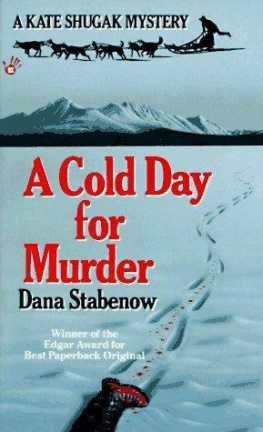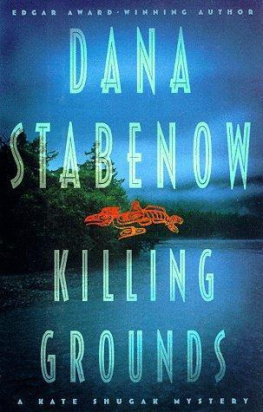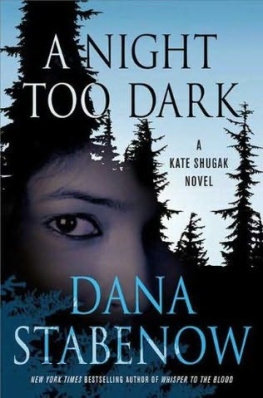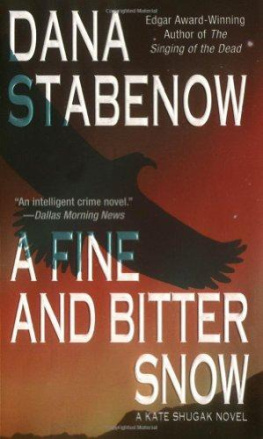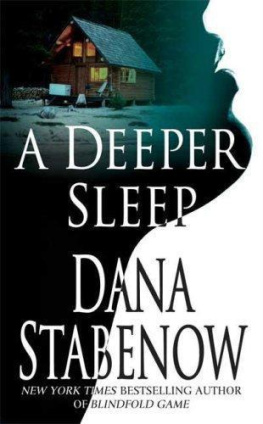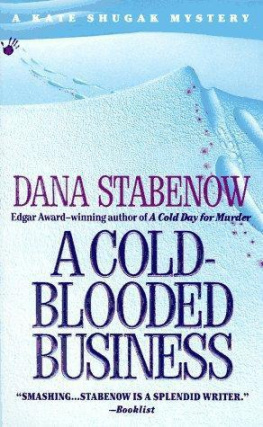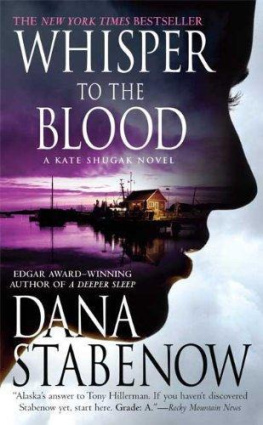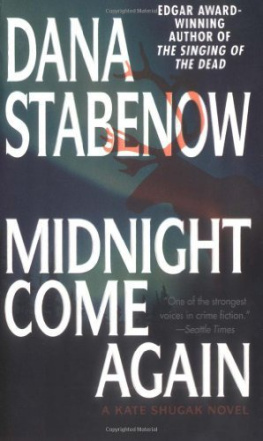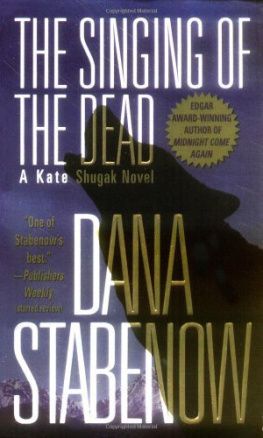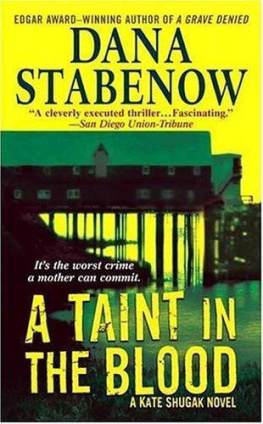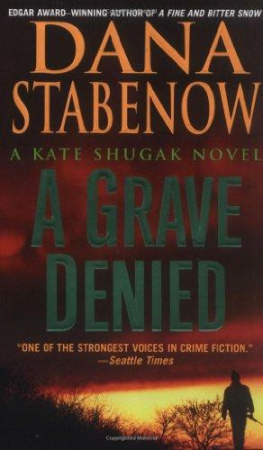A Cold Day For Murder
Kate Shugak 01
Dana Stabenow
BERKLEY PRIME CRIME, NEW YORK
If you purchased this book without a cover, you should be aware that this book is stolen property. It was reported as "unsold or destroyed" to the publisher, and neither the author nor the publisher has received any payment for this "stripped book."
This is a work of fiction. Names, characters, places, and incidents are either the product of the author's imagination or are used fictitiously, and any resemblance to actual persons, living or dead, business establishments, events, or locales is entirely coincidental.
A COLD DAY FOR MURDER
A Berkley Prime Crime Book published by arrangement with the author
PRINTING HISTORY
Berkley edition I June 1992
Berkley Prime Crime edition I November 1993
All rights reserved.
Copyright 1992 by Dana Stabenow.
This book, or parts thereof, may not be reproduced in any form without permission.
For information address:
The Berkley Publishing Group, a division of Penguin Putnam Inc.,
375 Hudson Street, New York, New York 10014.
The Penguin Putnam Inc. World Wide Web site address is http://www.penguinputnam.com
ISBN: 0-425-13301X
Berkley Prime Crime Books are published by The Berkley Publishing Group, a division of Penguin Putnam Inc., 375 Hudson Street, New York, New York 10014.
The name BERKLEY PRIME CRIME and the BERKLEY PRIME CRIME design are trademarks belonging to Penguin Putnam Inc.
PRINTED IN THE UNITED STATES OF AMERICA
20 19 18
For: Don Stabenow,
ONE.
My very own personal air taxi service and pyrotechnical adviser they came out of the south late that morning on a black and-silver Ski-doo LT. The driver had thick eyebrows and a thicker beard and a lush fur ruff around his hood, all rimmed with frost from the moisture of his breath. He was a big man, made larger by parka, down bib overalls, fur mukluks and thick fur gauntlets. His teeth were bared in a grin that was half-snarl. He looked like John Wayne ready to run the claim jumpers off his gold mine on that old White Mountain just a little southeast of Nome, if John Wayne had been outfitted by Eddie Bauer.
The man sitting behind him and clinging desperately to his seat was half his size and had no ruff around the edge of his hood. His face was a fragile layer of frost over skin drained a pasty white. He wore a down snowsuit at least three sizes too big for him, the bottoms of the legs coming down over his wingtip shoes. He wasn't smiling at all.
He looked like Sam McGee from Tennessee before he was stuffed into the furnace of the Alice May.
The rending, tearing noise of the snow machine's engine echoed across the landscape and affronted the arctic peace of that December day. It startled a moose stripping the bark from a stand of spindly birches. It sent a beaver back into her den in a swift-running stream. It woke a bald eagle roosting in the top of a spruce, causing him to glare down on the two men with malevolent eyes. The sky was of that crystal clarity that comes only to lands of the far north in winter; light, translucent, wanting cloud and color. Only the first blush of sunrise outlined the jagged peaks of mountains to the east, though it was well past nine in the morning. The snow was layered in graceful white curves beneath the alder and spruce and cottonwood, all the trees except for the spruce spare and leafless, though even the green spines of the spruce seemed faded to black this morning.
"I gotta take a leak," the man in back yelled in the driver's ear.
"You don't want to step off into the snow anywhere near here," the driver roared over the noise of the machine.
"Why not?" the passenger yelled back. A thin shard of ice cracked and slid from his cheek.
"It's deeper than it looks, probably over your head. You could founder here and never come up for air. Just hang on. It's not far now."
The machine lurched and skidded around a clump of trees, and the passenger held on and muttered to himself through clenched teeth. The big man's grin broadened.
Without warning they burst into a clearing. The big man reduced speed so abruptly that his passenger was thrown forward. When he hauled himself upright again and looked around, his first impression of the winter scene laid out before him was that it was just too immaculate, too orderly, too perfect to exist in a world of flawed, disorderly and imperfect men.
The log cabin in the clearing sat on the edge of a bluff that fell a hundred feet to the half-frozen Kanuyaq River below. Beyond the far bank of the river the land rose swiftly into the sharp peaks of the Quilak Mountains. The cabin, looking more as if it had grown there naturally rather than been built by human hands, stood at the center of a small semicircle of buildings.
At the left and slightly to the back there was an outhouse, tall, spare and functional. Several depressions in the snow around it indicated it had been moved more than once, which gave the man on the snow machine some idea of how long the homestead had been there. Next was a combined garage and shop, through the open door of which could be seen a snow machine, a small truck and assorted related gear. He found the sight of these indubitably twentieth-century products infinitely reassuring. Next to the cabin stood an elevated stand for a dozen fifty-five-gallon barrels of Chevron diesel fuel, stacked on their sides. Immediately to the right of the cabin was a greenhouse, its Visqueen panels opaque with frost. Next to it and completing the semicircle stood a cache elevated some ten feet in the air on peeled log stilts, with a narrow ladder leading to its single door.
Paths through the drifts of snow had been cut with almost surgical precision, linking every structure to its neighbor. The resulting half-circle was packed firm between tidy berms as level as a clipped hedge. One trail led directly to the wood pile, which the man judged held at least three cords, split as neatly as they were stacked.
Another pile of unsplit rounds stood next to the chopping block.
There were no footprints outside the trails. It seemed that this was one homesteader who kept herself to herself.
The glow of the wood of each structure testified to a yearly application of log oil. There wasn't a shake missing from any of the roofs. The usual dump of tires too worn to use but too good to throw away, the pile of leftover lumber cut in odd lengths but still good for something, someday, the stack of Blazo boxes to be used for shelves, the shiny hill of Blazo tins someday to carry water, the haphazard mound of empty, rusting fifty-five-gallon drums to be cut into stoves when the old one wore out, all these staples were missing. It was most unbushlike and positively un Alaskan He had a suspicion that when the snow melted the grass wouldn't dare to grow more than an inch tall, or the tomatoes in the greenhouse bear less than twelve to the vine. He was assailed by an unexpected and entirely unaccustomed feeling of inadequacy, and wished suddenly that he had taken the time to search out a parka and boots, the winter uniform of the Alaskan bush, before making this pilgrimage. At least then he would have been properly dressed to meet Jack London, who was undoubtedly inside the cabin in front of him, writing "To Build a Fire" and making countless future generations of Alaskan junior high English students miserable in the process. He would have been unsurprised to see Samuel Benton Steele mushing up the trail in his red Mountie coat and flat-brimmed Mountie hat. He would merely have turned to look for Soapy Smith moving fast in the other direction. He realized finally that his mouth was hanging half-open, closed it with something of a snap and wondered what kind of time warp they had wandered through on the way here, and if they would be able to find it again on the return to their own century.
Next page
